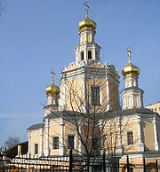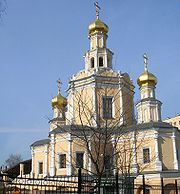
Prozorovsky
Encyclopedia
Princes Prozorovsky were a Russia
n noble family of Rurikid stock descending from medieval rulers of Yaroslavl
and Mologa
. Their name is derived from the village of Prozorovo near Mologa
, which used to be their only votchina
in the 15th century. During the Muscovite
During the Muscovite
period of Russian history, the most eminent member of the family was Prince Ivan Semyonovich Prozorovsky, a boyar
's son and boyar himself, who happened to govern Astrakhan
at the time of Stenka Razin
's uprising. When the rebels took the city, they had him defenestrated from a kremlin
tower. His little son was hung upside down on the city wall (1670). Ivan's inglorious death only added to the family standing, and six of his nephews became boyars during the early reign of Peter the Great
.
Prince Ivan Andreyevich Prozorovsky, an Elizabethan general-in-chief, helped launch the military career of his son-in-law, Alexander Suvorov
. The latter's life with Princess Daria Prozorovskaya was never peaceful. They separated early, and the Generalissimo
never recognized her son Arkady Suvorov as his own.
Prince Alexander Alexandrovich Prozorovsky
(1732-1809) was the only Field Marshal
from the family. He gained distinction in the Seven Years' War
and the conquest of Crimea
. In 1790 he returned to the active service as the Governor General of Moscow
. When the Russian army resumed its hostilities against Turkey
in 1808, Prozorovsky became its Commander-in-Chief.
In 1870, the Prozorovsky family became extinct in a male line. 16 years earlier, Emperor Nicholas I had authorized Prince Alexander Fyodorovich Galitzine
(1810-98) to take the name and arms of his maternal grandfather, Field-Marshal Alexander Prozorovsky. Galitzine's line became extinct in 1914, with the death of his only son, Prince Alexander Galitzine-Prozorovsky (1853-1914).
Russia
Russia or , officially known as both Russia and the Russian Federation , is a country in northern Eurasia. It is a federal semi-presidential republic, comprising 83 federal subjects...
n noble family of Rurikid stock descending from medieval rulers of Yaroslavl
Yaroslavl
Yaroslavl is a city and the administrative center of Yaroslavl Oblast, Russia, located northeast of Moscow. The historical part of the city, a World Heritage Site, is located at the confluence of the Volga and the Kotorosl Rivers. It is one of the Golden Ring cities, a group of historic cities...
and Mologa
Mologa
Mologa was a town in Yaroslavl Oblast, Russia, formerly situated at the confluence of Mologa and Volga Rivers, but now submerged under the waters of the Rybinsk Reservoir....
. Their name is derived from the village of Prozorovo near Mologa
Mologa
Mologa was a town in Yaroslavl Oblast, Russia, formerly situated at the confluence of Mologa and Volga Rivers, but now submerged under the waters of the Rybinsk Reservoir....
, which used to be their only votchina
Votchina
Votchina or otchina was an East Slavic land estate that could be inherited. The term "votchina" was also used to describe the lands of a knyaz.The term originated in the law of Kievan Rus...
in the 15th century.

Muscovite
Muscovite is a phyllosilicate mineral of aluminium and potassium with formula KAl22, or 236. It has a highly-perfect basal cleavage yielding remarkably-thin laminæ which are often highly elastic...
period of Russian history, the most eminent member of the family was Prince Ivan Semyonovich Prozorovsky, a boyar
Boyar
A boyar, or bolyar , was a member of the highest rank of the feudal Moscovian, Kievan Rus'ian, Bulgarian, Wallachian, and Moldavian aristocracies, second only to the ruling princes , from the 10th century through the 17th century....
's son and boyar himself, who happened to govern Astrakhan
Astrakhan
Astrakhan is a major city in southern European Russia and the administrative center of Astrakhan Oblast. The city lies on the left bank of the Volga River, close to where it discharges into the Caspian Sea at an altitude of below the sea level. Population:...
at the time of Stenka Razin
Stenka Razin
Stepan Timofeyevich Razin Тимофеевич Разин, ; 1630 – ) was a Cossack leader who led a major uprising against the nobility and Tsar's bureaucracy in South Russia.-Early life:...
's uprising. When the rebels took the city, they had him defenestrated from a kremlin
Kremlin
A kremlin , same root as in kremen is a major fortified central complex found in historic Russian cities. This word is often used to refer to the best-known one, the Moscow Kremlin, or metonymically to the government that is based there...
tower. His little son was hung upside down on the city wall (1670). Ivan's inglorious death only added to the family standing, and six of his nephews became boyars during the early reign of Peter the Great
Peter I of Russia
Peter the Great, Peter I or Pyotr Alexeyevich Romanov Dates indicated by the letters "O.S." are Old Style. All other dates in this article are New Style. ruled the Tsardom of Russia and later the Russian Empire from until his death, jointly ruling before 1696 with his half-brother, Ivan V...
.
Prince Ivan Andreyevich Prozorovsky, an Elizabethan general-in-chief, helped launch the military career of his son-in-law, Alexander Suvorov
Alexander Suvorov
Alexander Vasilyevich Suvorov , Count Suvorov of Rymnik, Prince in Italy, Count of the Holy Roman Empire , was the fourth and last generalissimo of the Russian Empire.One of the few great generals in history who never lost a battle along with the likes of Alexander...
. The latter's life with Princess Daria Prozorovskaya was never peaceful. They separated early, and the Generalissimo
Generalissimo
Generalissimo and Generalissimus are military ranks of the highest degree, superior to Field Marshal and other five-star ranks.-Usage:...
never recognized her son Arkady Suvorov as his own.
Prince Alexander Alexandrovich Prozorovsky
Alexander Prozorovsky
Prince Alexander Alexandrovich Prozorovsky was the only Field Marshal from the Prozorovsky family.He gained distinction in the Seven Years' War and the conquest of Crimea. Prozorovsky's career was furthered by his maternal Galitzine relatives, who helped him to get appointed to the office of...
(1732-1809) was the only Field Marshal
Field Marshal
Field Marshal is a military rank. Traditionally, it is the highest military rank in an army.-Etymology:The origin of the rank of field marshal dates to the early Middle Ages, originally meaning the keeper of the king's horses , from the time of the early Frankish kings.-Usage and hierarchical...
from the family. He gained distinction in the Seven Years' War
Seven Years' War
The Seven Years' War was a global military war between 1756 and 1763, involving most of the great powers of the time and affecting Europe, North America, Central America, the West African coast, India, and the Philippines...
and the conquest of Crimea
Russo-Turkish War, 1768-1774
The Russo-Turkish War of 1768–1774 was a decisive conflict that brought Southern Ukraine, Northern Caucasus, and Crimea within the orbit of the Russian Empire.-Background:...
. In 1790 he returned to the active service as the Governor General of Moscow
Moscow
Moscow is the capital, the most populous city, and the most populous federal subject of Russia. The city is a major political, economic, cultural, scientific, religious, financial, educational, and transportation centre of Russia and the continent...
. When the Russian army resumed its hostilities against Turkey
Russo-Turkish War, 1806-1812
The Russo-Turkish War was one of many wars fought between Imperial Russia and the Ottoman Empire.- Background :The war broke out in 1805–1806 against the background of the Napoleonic Wars...
in 1808, Prozorovsky became its Commander-in-Chief.
In 1870, the Prozorovsky family became extinct in a male line. 16 years earlier, Emperor Nicholas I had authorized Prince Alexander Fyodorovich Galitzine
Galitzine
For Orthodox clergyman and theologian, see Alexander Golitzin.The Galitzines are one of the largest and noblest princely houses of Russia. Since the extinction of the Korecki family in the 17th century, the Golitsyns have claimed dynastic seniority in the House of Gediminas...
(1810-98) to take the name and arms of his maternal grandfather, Field-Marshal Alexander Prozorovsky. Galitzine's line became extinct in 1914, with the death of his only son, Prince Alexander Galitzine-Prozorovsky (1853-1914).

